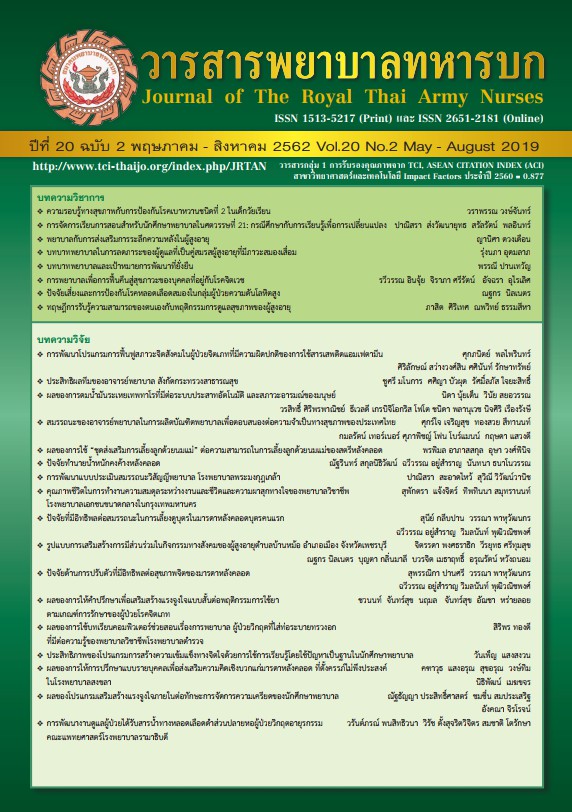A Confirmatory Factor Analysis of an Inpatient Department Users Experience Assessment form based on Healthcare Healing Environmental Concept
Keywords:
Confirmatory factor analysis, User service experience, Healing environmental conceptsAbstract
The objective of this research was to develop and check the concordance confirmatory of the inpatient department users experience assessment form based on healthcare healing environmental concept. The sample size was 200 patients in the inpatient ward of a secondary hospital in Thailand. The data were collected using the developed questionnaire with the Index of Consistency (IOC) = 0.93 and the Content Validity Index (CVI) = 0.915., Confirmatory Factor Analysis (CFA) and consideration by item get the suitable result, there are 35 variables in 5 elements or factors left. When analyzing the confirmatory factors found that the weight values of the factors were positive value between 0.518-0.888 with statistically significant level = 0.05. The results of the concordance test of the users experience model were found that the chi-squared score = 400.216 at the degree of freedom (df) = 448, the probability = 0.902 (CMIN/DF), the goodness-of-fit index (GFI), The adjusted goodness-of-fit index (AGFI) and Confirmatory Fit Index (CFI) = 0.902, 0.863 and 1.000 sequentially, The Standardized Root Mean Square Residual (SRMR) = 0.000 and the root mean square error of approximation (RMSEA) = 0.000 which shows that the model of the inpatients department users experience factors comply with the empirical data in good condition.
Downloads
References
Ulrich, RS. 1984. View through a window may influence recovery from surgery. Science. 1984:224 (4647):420-1.
WHO. Essential environmental health standards in health care, edited by Adams J, Bartram J and Chartier Y, Geneva : World Health Organization; 2008.
Stichler, J. F, and D. K Hamilton. Evidence-based design: what is it? Health Environments Research & Design Journal. 2008: 1 (2):3-4
Ulrich, R. S, C Zimring, A Joseph, X Quan, and B Choudhury. The role of the physical environment in the hospital of the 21st century: A once-in-a-lifetime opportunity. Concord, CA: The Center for Health Design. 2004.
Sadler BL, Joseph A, Keller A, Rostenberg B. Using evidence-based environmental design to enhance safety and quality. IHI Innovation Series white paper. Cambridge, Massachusetts: Institute for Healthcare Improvement; 2009.
Ancoli-Israel, S., Gehman, P., Martin, J. L., Shochat, T., Marler, M., Corey-Bloom, J., & Levi, L.: Increased Light Exposure Consolidates Sleep and Strengthens Circadian Rhythms in Severe Alzheimer’s Disease patients. Behavioral Sleep Medicine, 2003:1(1),22-36.
Alessi, C. A., Martin, J. L., Webber, A. P., Kim, E. C., Harker, J. O., & Josephson, K. P.: Randomized, controlled trial of a Nonphamacological Intervention to Improve Abnomal Sleep/wake Patterns in Nursing Home residents. Journal of the American Geriatircs Society, 2005: 53(5), 803-810.
Epstein, M., Hansen, V., & Hazen, T.: Therapeutic Gardens: Plant centered Activities meet Sensory, Physical and Psychosocial Needs, Oreg J Aging, 1991: 9, 8-14.
Yoo, I. Y. A study on healing environmental factors in the elderly patients with long-term care, Int. 2015.
Guide line for evaluation and certification of quality district. (in Thai)
Hair JF, Black WC, Babin BJ, Anderson RE. Multivariate data analysis. 7th ed. New Jersey : Pearson Education; 2010.
Tabachnick BG, Fidell LS. Using multivariate statistics. Pearson; 2007.
Phaisan W. Educational Research. 5th edition. Mahasarakarm: Takkasilakanpim; 2012.
Jiang, S. P., Huang, L. W., Chen, X. L., Wang, J. F., Wu, W., Yin, S. M. and et al. Ventilation of wards and nosocomial outbreak of severe acute respiratory syndrome among healthcare workers. Chin. Med. J. 2003: 9 : 1293-1297.
Menzies, D., Fanning, A., Yuan, L., Fitzgerald, M. and the canadian collaborative group in nosocomial transmission of TB. Hospital ventilation and risk for tuberculosis infection in Canadian health care works. Ann. Intern. Med. 2000 : 10 :779-789.
Ulrich, R. S, C Zimring, XZ Barch, X Zhu, J DuBose, HB Seo, YS Choi, X Quan, and A Joseph. A review of the research literature on evidence-based healthcare design. HERD. 2008 :3 : 61-125.
Laitinen, P, and Isola, A., Promoting participation of informal caregivers in the hospital care of the elderly patient: Informal caregivers’ perceptions. J. Adv. Nurs. 1996 :5 : 942-947.
Chaudhury, H., Mahmood, A. and Valente, M., Nurses’ perception of single-occupancy versus multioccupancy rooms in acute care environments: An exploratory comparative assessment. Appl. Nurs. Res. 2006:3 : 118-125.
Dellinger, B. Healing environment in evidence-based design for healthcare facilities, edited by McCullough, C.,Indianapolis : Sigma Theta Tau International; 2010.
Ulrich, R. S, Zimring, C., Quan, X., and Joseph, A. The environment’s impact on stress. In Improving healthcare with better building design, edited by Marberry, S., Chicago: Health Administration Press; 2006.
Dellinger, Barbara. Healing Environment. In evidence-based design for healthcare facilities, edited by C. McCullough. Indianapolis: Sigma Theta Tau International; 2010.
Cheungsatientsup. K., Chungsatientsup. K., Sararum, T. and Phaensomboon, P. Healthcare architecture and healing environment. 2nd ed. Suksara Publishing House. Society and Health Institute : Nonthaburi; 2018. (in Thai)
Joseph CJ jr, Taylor SA. Measuring service quality : A reexamination and extension, J. Marke. 1992;56 (3) : 55-68.
Siwaromya, W., The quality improving of basic health services of district and sub-district health promotion hospitals in 10th and 12th public health areas, Research Report. Knowledge Center. Department of Health Promotion : Nonthaburi; 2012. (in Thai)
Jongsangaklang, N., Samosornsuk, W., Aathongmak, T., Customers perceptions on service quality of Thammasat University Hospital. Research Article. Thai Science and Technology Journal 2018;26 (2) : 329-342. (in Thai)
Chobsook. C., Arayathanikul, B., Lamtrakul, S., Tonseni, C., Pumsrinil, P., Yingprasert, P. Development of a Nursing Documentation Form of Pediatric Intensive Care Unit, Phramaogkutklao Hospital. Journal of The Royal Thai Army Nurses 2018 : 19 (2) : 231-250. (in Thai)
Downloads
Published
How to Cite
Issue
Section
License
บทความหรือข้อคิดเห็นใดใดที่ปรากฏในวารสารพยาบาลทหารบกเป็นวรรณกรรมของผู้เขียน ซึ่งบรรณาธิการหรือสมาคมพยาบาลทหารบก ไม่จำเป็นต้องเห็นด้วย
บทความที่ได้รับการตีพิมพ์เป็นลิขสิทธิ์ของวารสารพยาบาลทหารบก
The ideas and opinions expressed in the Journal of The Royal Thai Army Nurses are those of the authors and not necessarily those
of the editor or Royal Thai Army Nurses Association.






